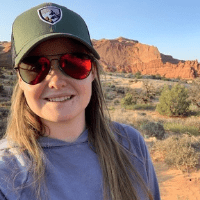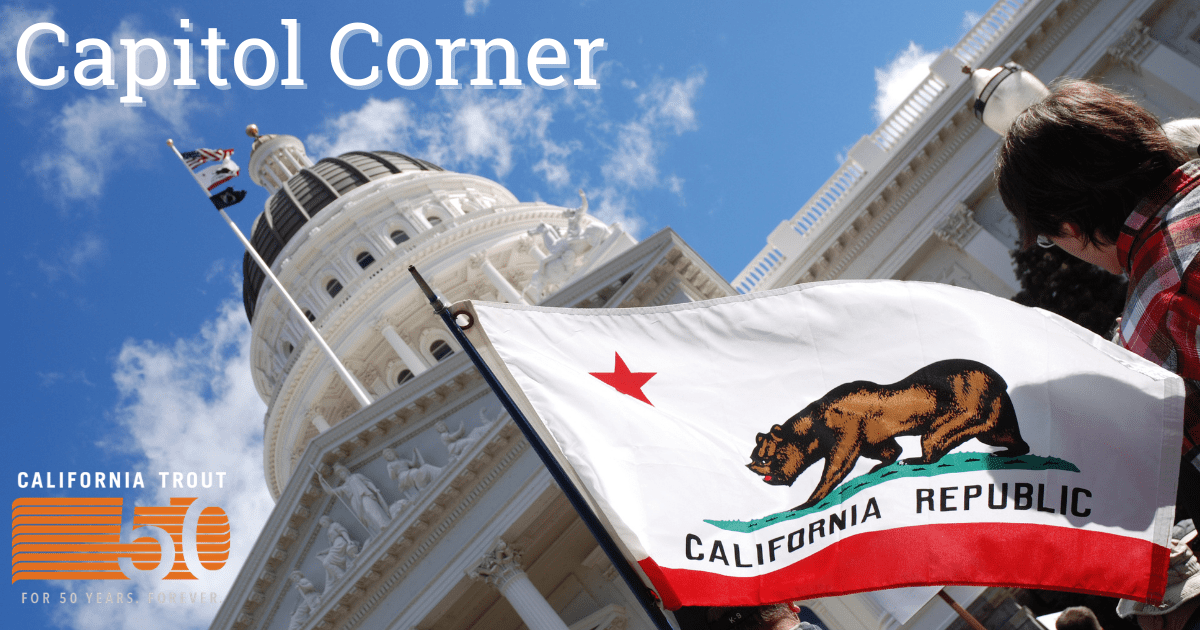Capitol Corner: Green California Advocacy Day
Welcome to Capitol Corner, a new series dedicated to providing updates on CalTrout’s legislative and policy work. CalTrout’s policy team includes Redgie Collins (Legal and Policy Director), Analise Rivero (Policy Associate), and Kam Bezdek (Policy Intern). Between these three, they are responsible for the development and implementation of CalTrout’s natural resource and water policy agenda in the California state legislature. This includes supporting CalTrout’s organizational goals through regulatory and public funding advocacy, agency relationship building, partnership development and other policy-related objectives that add to CalTrout’s success.
 By Kam Bezdek
By Kam Bezdek
Over the past week, I was able to participate in the Green California (Green CA) Advocacy Day, in which over 100 various organizations (like California Trout) came together to advocate for specific priority bills to the California state legislature. Collaboration is the key to effective advocacy. United by our focus on core issues of the environment, public health and social justice, Green CA participants help provide lawmakers with a real sense of the environmental community’s most important priorities.
While Green CA was a chance to broaden my experience of environmental advocacy and to meet different organizations and individuals, it also gave me a more thorough understanding of the state legislature’s process and the issues that affect California residents across the state.
My introduction to California’s legislative members began a few weeks prior to Advocacy Day. One of my first internship assignments with CalTrout was to research several legislators in specific committees throughout the California State Assembly and Senate, such as the Joint Committee on Fish and Aquaculture and the Assembly Committee on Natural Resources. I researched each member’s legislative work and goals as well as the biggest problems facing their respective districts, which provided background information heading into Advocacy Day. The preliminary meeting for Advocacy Day was focused on several new pieces of legislation for the group to divide up and discuss with our assigned legislator(s) in the meetings during the following two days.
Groups met an additional 15-30 minutes before each assigned meeting with a legislator or their staff members to discuss speaking roles and to ensure that everyone was on the same page. I enjoyed meeting these other individuals and familiarizing myself with other non-governmental organizations in California. We spoke about the bills themselves, but we also discussed the ways in which individuals on my team were personally involved with influencing legislation; the organizations’ official positions on bills; and why they believed these issues should be prioritized. While each of us attended Green CA for the same general cause, we came from different sides of the fight for environmental conservation and were able to address and understand a variety of concerns surrounding each bill we were asked to present.
The diversity of our group proved to be of further importance as we entered those assigned meetings; some of our presentation and conservations were inevitably diverted due to impromptu questions. While discussing Senate Bill (SB) 1346, on Zero-Emission Small Off-Road Engines, the conversation shifted from small-engine vehicles to a broader scope, which included diesel shipping trucks under large corporations such as Amazon. CalTrout shared a similar perspective with the Environmental Working Group (EWC) and The Nature Conservancy (TNC) in terms of the environmental impact of engine emissions from diesel engines. Representatives from Catholic Charities and the American Lung Association were also on the call and expressed the additional concerns of the personal health of the drivers operating those trucks, pointing out that they are likely operating the trucks to their own risk. Furthermore, other individuals with strong backgrounds in finance were speaking to the fears that transitioning to zero emissions would ultimately be costly and financially burdensome. Still, the group was reassured (plus the staffers and legislators we were speaking to) that going zero emissions was comparable in price and would be an easy financial transition for most companies to make.
Through my experiences working in policy, I've been given the opportunity to work on a larger variety of issues, through which I’ve ultimately gained a better understanding of what California residents grapple with daily. My previous research was laser-focused on appropriate environmental legislation that aligned with CalTrout’s work. For example, the Freedom to Walk Act, Assembly Bill (AB) 1238, brought me into a discussion on over-policing in communities. This bill works to legalize safe crossing (as traffic permits) outside of crosswalks and designated walking cycles to protect pedestrians, but also to lighten the financial burden on low-income residents and specific communities that are subject to minor traffic fines and penalties. This bill was specifically introduced to protect the Black and Latinx communities who are disproportionately over-policed and to recognize pedestrian rights in public roadways. In instances such as these, I was able to see how truly connected environmental advocacy was to communities in more ways than one. The highways where this over-policing occurs are the same highways that we strive to clean to prevent toxic runoff and where we display advertisements for products that could either hurt or help the planet. The beauty of Advocacy Day was that there were individuals and organizations present to address all of this.
Face-to-face conversations (over Zoom) with legislators and their staffers was incredibly effective. My team could answer questions immediately, and throughout all my meetings there was a conversational feel in which both parties brought valuable discussion to the table and left with a better understanding of the other. Open communication flowed easily and allowed us to pass through formalities and delve into the heart of the matter, or to other instances where these bills could apply in the future.
Green CA Advocacy Day was an incredible opportunity to participate in real conversations and to familiarize myself with California’s legislature and policy. I enjoyed interacting with new ideas, issues and policies and I feel this was a great introduction to what I will encounter throughout a career in environmental policy.
ABOUT KAM BEZDEK: I recently graduated from Loyola University Maryland with a BA in Philosophy. While I've had deep personal connections to water and advocacy since I was young, I decided in college to play a role in the protection of Western water. When not reading or working, I enjoy being outdoors and spending time in the kitchen cooking with my family.





